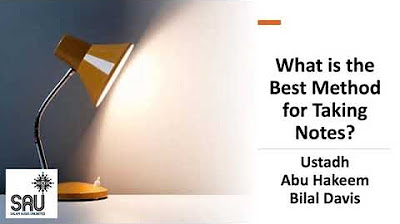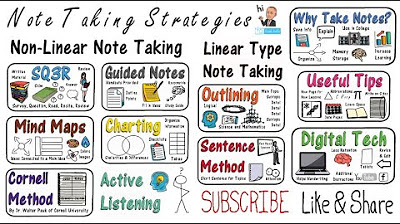SAVE 100s of Hours | DON’T Make Notes For GOD’s Sake!
Summary
TLDRThe video script discusses the importance of note-taking without limits, emphasizing the value of capturing ideas and data from various sources, including plants and high-tech aliens. It humorously touches on the inefficiency of certain study methods, the need for clear and concise notes, and the pitfalls of relying too heavily on electronic devices. The speaker also stresses the significance of headings in notes for better organization and retrieval of information, advocating for a balance between technology and traditional note-taking techniques.
Takeaways
- 📒 The speaker emphasizes the importance of taking notes without limits, as it helps in understanding and retaining information better.
- 🚫 The speaker mentions that one should not write everything down in a formulaic manner, as it can be restrictive and hinder the learning process.
- 🔍 The speaker suggests that students should focus on understanding the concepts rather than just copying notes, which is an inefficient method.
- 🤔 The speaker talks about the lack of questions from students and the need for them to engage more with the material to solve problems effectively.
- 👨🏫 The speaker shares a story about a student named Ajay, highlighting the inefficiency of note-taking during lectures and the importance of revising notes afterward.
- 📚 The speaker criticizes the overemphasis on note-making to the point where it becomes a burden rather than a tool for learning.
- 🕒 The speaker mentions that students should spend time understanding and revising notes rather than just focusing on making them during lectures.
- 📝 The speaker differentiates between different types of notes, such as class notes, workout notes, and short notes, and the context in which they should be used.
- 🌟 The speaker suggests that notes should be clear and concise, allowing for easy review and understanding, rather than being overly detailed or cluttered.
- 📉 The speaker warns against the pitfalls of relying too much on electronic devices for note-taking, advocating for a balance between digital and traditional methods.
- 💡 The speaker encourages students to be creative and original in their note-taking process, rather than just copying from others or relying on pre-made notes.
Q & A
What is the main topic discussed in the script?
-The main topic discussed in the script is the importance of effective note-taking and learning strategies, as well as the speaker's personal experiences and views on education.
Why does the speaker emphasize not taking notes in a certain way?
-The speaker emphasizes not taking notes in a way that hampers understanding, suggesting that notes should be used to aid comprehension and not just as a means of memorization.
What is the speaker's view on the use of technology in learning?
-The speaker seems to have a mixed view on the use of technology in learning, mentioning both its potential to aid understanding and the risk of it being a distraction if not used properly.
What is the significance of 'headings' in note-taking according to the speaker?
-According to the speaker, headings are important in note-taking as they help in organizing information and making it easier to navigate through the notes.
Why does the speaker mention 'Tulsi Improvement' in the script?
-The mention of 'Tulsi Improvement' seems to be a metaphor or an example used by the speaker to illustrate a point about progress or improvement in learning or life.
What does the speaker suggest about the relationship between note-taking and memory?
-The speaker suggests that while note-taking can aid memory, it should not be solely relied upon. Understanding and internalizing the information is more important than just remembering it.
What is the speaker's opinion on the length of time one should spend on preparing for an exam?
-The speaker implies that preparation for an exam should be a long-term process, not something done in a rush, and that six years of preparation might be ideal for some.
What is the purpose of the speaker's anecdote about a student named Ajay?
-The anecdote about Ajay serves to illustrate the importance of effective note-taking and the pitfalls of relying too heavily on notes without understanding the underlying concepts.
What does the speaker mean by 'the struggle is your own' in the context of learning?
-The phrase 'the struggle is your own' suggests that each individual must take personal responsibility for their learning process and not rely solely on external sources or shortcuts.
How does the speaker view the role of a teacher in the learning process?
-The speaker views the role of a teacher as crucial in guiding and providing direction for students, but also emphasizes the importance of students taking initiative and being proactive in their learning.
Outlines

This section is available to paid users only. Please upgrade to access this part.
Upgrade NowMindmap

This section is available to paid users only. Please upgrade to access this part.
Upgrade NowKeywords

This section is available to paid users only. Please upgrade to access this part.
Upgrade NowHighlights

This section is available to paid users only. Please upgrade to access this part.
Upgrade NowTranscripts

This section is available to paid users only. Please upgrade to access this part.
Upgrade NowBrowse More Related Video

My Planning System For Note Taking & Time Management | Cal Newport

What is the Best Method for Taking Notes? - Abu Hakeem Bilal Davis

Note Taking: Strategies & Techniques

Summarizing Key Information

When It Comes To Taking Notes, Here's What Really Matters (Organize Your Life) | Cal Newport

Why your terrible note-taking is ruining your grades (how to take better notes)
5.0 / 5 (0 votes)